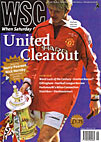 It was hasrd to pick a really good team in the basement but, as Nick House reports, it definately wasn't Torquay.
It was hasrd to pick a really good team in the basement but, as Nick House reports, it definately wasn't Torquay.
Win, lose or draw, the post-match ritual never changes. The Third Division manager shares his exclusive insights with the local press: “It’s such a tight division this year. Three wins and you’re up near the play-offs. We’re as good as anybody. We’ll be there at the death.” The hack looks unimpressed. “Or thereabouts.”
The manager’s arithmetic proves as suspect as his team. They can reach the play-offs provided they get 31 points from ten games and every other team loses every match. Or, in the words of Torquay’s Wes Saunders: “Another nine wins and we would have been there."
This is tosh, coming from the manager of the team which finished 20th, five points above Scarborough. If Torquay near-missed so did a dozen others, each accompanied by Play-Off Hopes Raised (after a win) and Play-Off Hopes Dashed (after a defeat) headlines in the Argus/Post/Herald/Echo. The Third Division illusion: we’re all equal and we’ve all got a chance.
Not that last season saw rapid ascent or descent. It was rather boring, but keep that quiet because we need continued stimulation each and every season. Nineteen clubs finished within four positions of their mid-season placing. The eventual promoted and play-off teams filled seven of the top 11 places on December 31st. The Late-Season Charge Award goes to Exeter City: up seven to 12th, eight points short of the play-offs. Exciting times in the Cowshed.
Yet the perception remains of a much-of-a-muchness division. Reviewing the 1997-98 season in WSC 136, Mark Staniforth identified three categories of club: Notts County, Doncaster Rovers and The Rest. Last season little changed. Brentford were no Notts County, Scarborough no Doncaster. The champions averaged less than two points a game, and had Scarborough won their last match Carlisle would have been relegated with a record 49 points. The whole division was The Rest.
Brentford, Cambridge and Cardiff were superior to the rest, but not by enough to bet confidently on the outcome of any top v bottom clash. The teams with the most points had the odd better player, greater organisation and enjoyed good fortune. And consistency, the very staff of life which separates Bluebirds from Monkey Men.
The play-off teams were a drab bunch, mainly serving to foster the hopes of others and to prove little is needed to finish in the top seven. Just below them, Mansfield faltered as debts grew. Events at Field Mill are being monitored by seasoned crisis-watchers. Two summers ago the early-warning signs of Doncaster’s demise were greeted with relief by 23 sets of supporters. Fans United, but only to a point.
Peterborough were the enigma. Full of talented youngsters, full of Barry Fry. To this observer, Posh’s 4-0 April victory over Torquay hinted at better things to come. Matthew Etherington has even attracted those Premiership clubs renowned for scouting the Third Division with lengthy bargepoles.
For lesser talent all offers will be gratefully received. Just saying no is not an option. The usual deal for the cream will be a £250,000 down payment from a First Division club, supplemented by all manner of unfathomable instalments and extra payments. A sell-on clause is usually included, the terms of which appear to contradict other aspects of the transaction. Teletext will report this as a £750,000 deal, much to the chagrin of the selling club, especially if the buyers are Crystal Palace.
In a division featuring Waddle, Beardsley and Southall, emerging talent is hard to spot. The Third Division is notoriously difficult to follow, fans being reliant on the Heralds, Echos and Posts. Yet promising youngsters are, within their own square mile, promoted as eagerly as play-off credentials. Now that many clubs are switching to Under-19 youth set-ups, more players are likely to be given the star-of-the-future treatment on the basis of a ten-minute substitute appearance against Rochdale. It smacks of desperation, but what the heck.
For what it’s worth, this particular corner of the country has already been alerted to the multi-million pound poten-tial of teenagers Wayne Thomas (Torquay), Geoff Breslan (Exeter) and Darren Bastow (Plymouth) as well as the more mature talent of Eifion Williams (Torquay). These hopes emanate from a region where Martin Phillips (ex-Exeter) was once lauded as a “£10 million wonder kid”.
The Third Division sells to survive, but survive as what? The division’s fans and club officials invariably wear two badges of honour. One says: my club is fully professional. The other proudly declares that that club plays in a national competition. Each is cherished, sacrosanct. Retaining Football League membership for 70 years is a great triumph. What we have, we hold.
Regionalisation and part-time football debates visit the Third as frequently as Cardiff City. At present each is off the agenda, but will probably be back very soon. To admit a preference for regional and/or part-time football is heretical. Yet, if going part-time is economically sound, why remain full-time?
Part-time or full-time, the division would still contain the 69th to 92nd best teams in the country. Even with regionalisation, the occasion of Exeter v Kidderminster or Rotherham v Southport should, in theory, be little different to Exeter v Rotherham. The problem lies in perception. The football and the event should be as before but would each be seen as such? Herein lies the challenge.
The Third Division needs to follow events in the First with as much interest as it shows in its own affairs. If the First Division succeeds in becoming Premiership Two, the future for all of us down here will look very different.
From WSC 150 August 1999. What was happening this month